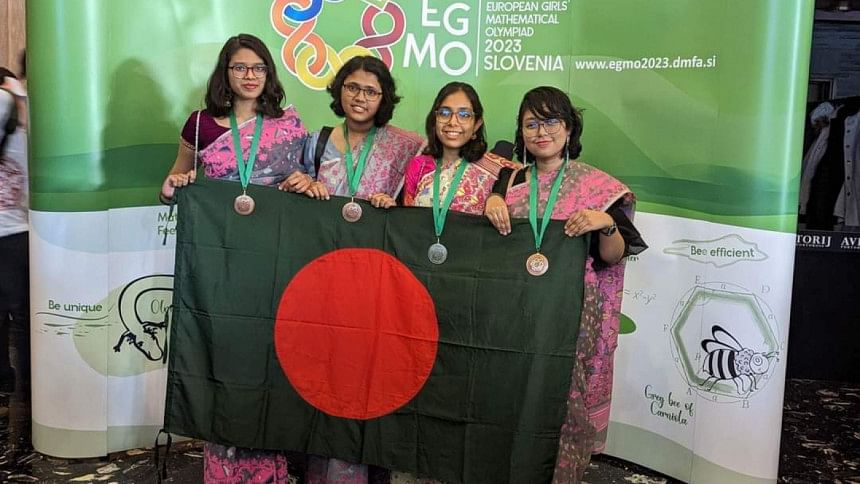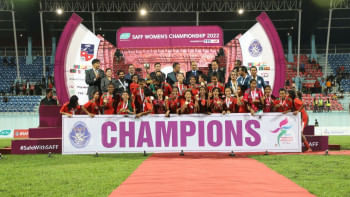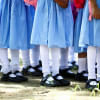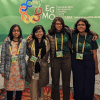We must teach our girls to embrace risks, not fear them

In 2015, Bangladesh beat India at the International Mathematical Olympiad (IMO). It happened again in 2017. The team of girls then beat India in 2021, and now they have beaten India again in this year in the most prestigious worldwide pre-university academic competition for women. In April this year, Bangladesh placed 20th in the European Girls Mathematical Olympiad held in Slovenia, while India placed 21st. Each Bangladeshi contestant won a medal. Nujhat Ahmed Disha won a silver medal and was ranked 15th out of 150 contestants. Saniva Rakib Soha, Afsana Akter, and Arifa Alam all won bronze medals.
It is difficult to explain the significance of this achievement to those unfamiliar with the extraordinary difficulty of the problems presented at these olympiads. Unlike other competitions, the IMO and EGMO national teams are composed of many of the brightest young people in the entire country. Most PhD faculty in mathematics cannot solve all of the problems of the two-day test. But Nujhat Ahmed Disha, for example, solved five of the six problems.
This year, China placed first and the US placed second at the EGMO. This was the first time Bangladesh travelled abroad to participate in the EGMO.
Brac University, under the leadership of Dr Sadia Hamid Kazi, hosted a celebration of the girls' achievements on June 24. Luminaries including Professor Yasmin Haque, Professor Muhammad Kaykobad, and Professor Zafar Iqbal were present. Dr Kazi, who is also the chairperson of the Girls Mathematical Olympiad Committee, told the girls, "As a woman, I know young girls face more challenges than boys. In my class, most students were male. This asymmetrical ratio resulted from our social infrastructure, how we see girls, and how families feel the need to protect them and not give them the independence to do whatever they want in their life. However, our girls are breaking these barriers and doing well in STEM. The success of the Bangladesh girls' maths team in the 12th EGMO is a testament to that. We want to make sure that not only these four young girls, but all the girls of Bangladesh have the safe environment and independence that would propel them towards excellence in Science and Mathematics."
Bangladesh's EGMO participation is the brainchild of Ipshita Bonhi Upoma, who worked tirelessly and without help to make Bangladesh's participation a reality. She is currently a MSc student of theoretical physics at the University of Durham. Together with Tamanna Islam Urmi, Zadid Hasan, and several others this year, they managed to raise Tk 20 lakh through crowdfunding and local sponsors. Rose Leemon Credit Reports & Collections Ltd provided the airfare monies, Ankur Foundation provided tremendous help with crowdfunding, and Abdul Monem Limited, Bangladesh's first EGMO sponsor, provided additional funds.
The girls' maths olympiad movement is an outgrowth of the Bangladesh Mathematical Olympiad, which has over the past 17 years brought enormous prestige to Bangladesh. It was the brainchild of Professor Muhammad Kaykobad, Professor Zafar Iqbal, and late Professor Jamilur Reza Chowdhury, who was its chairperson, in 2004 and has been funded by Dutch-Bangla Bank and organised by Munir Hasan. Many of the country's best students were trained by the academic team behind me. However, we lacked the ability to give our girls the mentorship they needed. That is why the girls' maths olympiad movement began.
People often ask why there is a need for a separate competition for women. Are girls not good enough at maths to compete with the boys? In fact, this is a belief held by many males in Bangladesh and abroad. For example, even the economist and former president of Harvard University, Dr Larry Summers had claimed that men outperform women in maths and science because of genetics. Those of us who work with exceptionally talented boys and girls know this is not true. But it is precisely because of these attitudes that girls need a separate space in which they can take academic risks. In usual mixed-gender spaces, whenever girls take a risk and fail, boys view this as confirmation that "girls aren't good at maths or programming." Sometimes, they make the girls feel very uncomfortable, embarrassed, and discouraged.
In a culture where there is already a lack of encouragement for women to do hard things, when girls do try and fail and are slammed by some boys for not 'being smart enough,' girls will not succeed. These girls, unless they are exceptionally strong, will not try again. And to do anything difficult, you must try and fail, then try again and fail many, many times before you achieve success.
Many families that value girls' education expect girls to take "safe routes" to success through, for example, diligent studying of traditional subjects. Girls are therefore understandably reluctant to take academic risks, as failure has more severe consequences for them than for boys. Boys don't usually get married off due to failing at school, nor do they get pigeonholed into occupations that are easier to succeed in and pose fewer risks of failures.
When we speak of academic risk-taking, we mean participating in maths or programming contests or other very challenging activities. Being a top student isn't always very helpful in these difficult competitions, but being an extremely creative problem-solver is vital. For example, none of the top male students at Notre Dame College, Dhaka have made the Bangladesh Mathematical Olympiad team. In addition, persistence and having the freedom to take advantage of classes and camps outside the home is very important. Girls, unlike boys, are often not allowed to participate in such activities. For example, many of our best girls throughout the years were not allowed to attend the National Math Olympiad Camps and were never able to develop the tremendous potential they showed when they were younger.
Therefore, in a culture where there is already a lack of encouragement for women to do hard things, when girls do try and fail and are slammed by some boys for not "being smart enough," girls will not succeed. These girls, unless they are exceptionally strong, will not try again. And to do anything difficult, you must try and fail, then try again and fail many, many times before you achieve success.
The girls who have done exceptionally well in our maths olympiad programmes have displayed extraordinary mental toughness. But girls also shouldn't have to be so tough in order to be successful in conquering most challenges. We shouldn't force them to act as hyperactive or aggressive as boys are traditionally taught to be.
Bangladesh's EGMO success has shown that its girls are among the best in the world. We hope that it will bring about change in our attitudes towards women's education. We often feel proud of encouraging girls to become educated, but then many expect them to choose the easiest paths to success. Girls should be allowed to reach for the stars and be allowed to fail, and be encouraged to keep reaching for the stars.
Dr Mahbub Majumdar is the National Coach of the Bangladesh Mathematical Olympiad Team and has been involved with the Girls Mathematical Olympiad initiative since its inception. He is also the Dean of the School of Data & Sciences at Brac University.

 For all latest news, follow The Daily Star's Google News channel.
For all latest news, follow The Daily Star's Google News channel. 











Comments